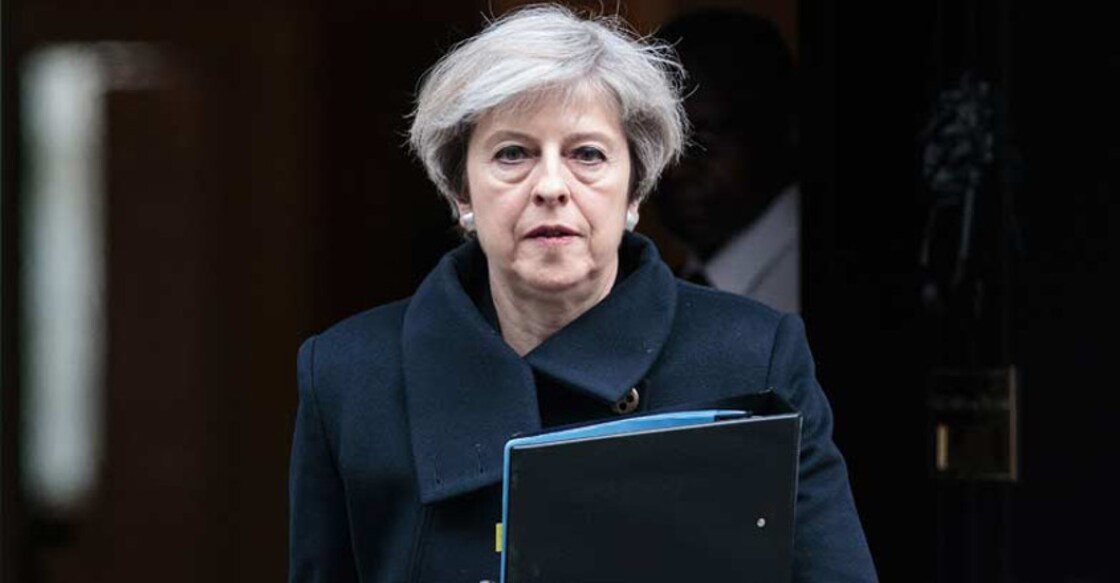The Brexit tragedy

Mail This Article
The Brexit reminds one of Shakespeare's famous tragedy Macbeth and the eponymous hero's words about life, It is a tale told by an idiot full of sound and fury, signifying nothing. One might add that the unfolding tragedy of Brexit portends disaster for the United Kingdom irrespective how it ends. There are three possible endings. One a hard exit damaging UK's economy and even its political unity. Two, a soft exit which makes the former state preferable in many ways. And the third is continued uncertainty damaging the economy and polity, and consequently the society.
Britain has always been Janus-eyed, with one eye looking towards the United States, once its colony, lost because of the stupid policies of King George III. The other eye looks towards the European continent where Britain never felt totally at home. In the 18th and 19th centuries, London played the game of balance of power skillfully. The World War II diminished Britain and left Europe in a miserable condition. Far-sighted statesmen such as Jean Monnet and Robert Schumann wanted to prevent another war in Europe between Germany and France. They formed the European Coal and Steel Community that eventually became the European Union, a singular misnomer as Europe is currently more becoming more and more disunited.
However, when the Continent embarked on integration, first of the market, followed by closer integration in other areas, London, initially stood aloof. When it applied for membership France's legendary leader Charles de Gaulle vetoed the application twice, in 1963 and 1967. Finally, the UK got in in 1972.
It was Napoleon who called Britain a land of shopkeepers. London was interested only in market integration. At the same time, it was not alert enough to prevent the move towards a deeper and broader integration. Thus, the European integration reached a stage when it appeared that a set of bureaucrats in Brussels imposed their will on Britain. A referendum held in 1975 showed that 67.2% wanted to remain in.
When Prime Minister Cameron was standing for re-election in 2015 in order to collect votes he promised to hold a referendum on EU. That was foolish unless he had good reason to assess that the EU link will be approved in the referendum. Cameron once found it difficult to recall the year of the Magna Carta which schoolboys and girls know. He compounded his folly by actually arranging for the referendum as he was foolishly confident of the voters saying 'yes' to Europe. In a referendum the voters confuse between the substance of the referendum and their own grievances against the incumbent government. The Brexiters won by a narrow margin of 52% against 48%; Cameron resigned; and Theresa May, Home Secretary, took over as Prime Minister. This happened in June 2016.
May has been more than a minor disaster. She dissolved the House ahead of time in order to get a larger majority. She lost her majority and had to stitch up a coalition with a party in Northern Ireland (Democratic Unionist Party). The Brexit leaders had resorted to outright lies and the British voter voted foolishly.
May herself had voted against Brexit, but she has to implement Brexit. That is indeed a fool's errand. Her cabinet was a house divided against itself. After serpentine negotiations she announced on 14th November that her cabinet had approved a 585-page document negotiated with Brussels. Hours later a spate of ministerial resignations followed. Obviously, May can mistake about what her ministerial colleagues think of her proposal.

The sticking points include the control of the border between Northern Ireland, a part of the UK, and Republic of Ireland. It may be recalled that the Irish struggle for independence starting from the famous 1916 Easter Rising inspired leaders of India's struggle for independence. A part of Ireland became free as the Republic of Ireland. But, Northern Ireland remained within the UK. The Catholics and others in Northern Ireland carried out a violent campaign for seceding from United Kingdom. Finally, the British people displayed wisdom when the Good Friday Agreement of 1998 was arrived at. It put an end to violence and one of the important provisions is that there is no control at the border between the two Irelands. The question is after Brexit how the border will be regulated. On this there is dispute within the UK and the EU-27 has taken a firm stand that there should not be any change as desired by the Republic of Ireland.
Trade
Another bone of contention is trade. If London chooses to remain the single market after Brexit, it will have to comply with EU legislation decided by Brussels.
In short, Great Britain should not have embarked on this perilous journey that might reduce it to Little England. Scotland does not want to leave EU.
May who did not want Brexit should have taken a leaf from Machiavelli. She should have negotiated a 'hard Brexit' damaging Britain's economy in a big way and then put that to a referendum. The psephologists have claimed that a new referendum will reject Brexit by a margin of 4%. But, is May capable of that act of leadership? The answer is woefully clear. Her days, most likely, are numbered. The pound is plummeting.
Brexit will harm India in many ways. Our companies have used Britain as gateway to Europe. Further, a post-Brexit Britain is likely to be more inward looking.
In short, Brexit is a man-made disaster.
(The author is a former Indian ambassador)

